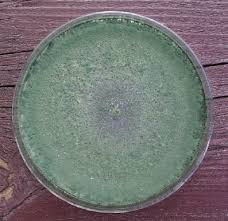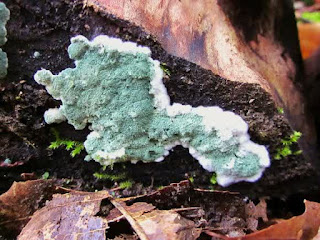The use of biological agents are now beginning to be developed in order to reduce the use of synthetic fungicides in controlling pathogens has many weaknesses. Understanding the biological agents according to the FAO (1988) is a microorganism, either occurring naturally such as bacteria, fungi, viruses and protozoa, as well as genetically engineered (genetically modified microorganisms) used to control plant pests (OPT) which is then complemented by criteria ie organisms that can reproduce itself as parasitoids, predators, parasites, arthropods herbivores and pathogens (FAO, 1988: FAO, 1997, in Supriya 2006).
Greetings friends of farmers, this time I will discuss about trichoderma, what it trichoderama ?? according to some literature Trichoderma sp is a kind of fungus / fungi including ascomycetes class. Trichoderma sp has antifungal activity. Trichoderma in natural forests are found in soil and agricultural land, or the woody substrate.
Greetings friends of farmers, this time I will discuss about trichoderma, what it trichoderama ?? according to some literature Trichoderma sp is a kind of fungus / fungi including ascomycetes class. Trichoderma sp has antifungal activity. Trichoderma in natural forests are found in soil and agricultural land, or the woody substrate.
The main potential of Trichoderma sp is as biological control fungal pathogens in plants. This fungus is naturally a parasite that attacks many types of fungi that cause plant diseases (broad spectrum control). Trichoderma sp. can be hiperparasit on some types of fungi that cause plant diseases, growing very quickly and not become a disease of higher plants (Purwantisari and Hastuti, 2009).
Trichoderma sp can produce the enzyme chitinase. According Habazar and Yaherwandi (2006), Trichoderma harzianum produces an enzyme chitinase which makes catalytic hydrolysis of chitin from pathogenic fungal hyphae wall, causing lysis. This enzyme is composed of eksokitinase, endokitinase and chitobiosidase.
Rogis et al (2007) also stated that chitinase is an enzyme that is important in the control of pathogens because of the activity of this enzyme may lead to the disintegration of the cell walls of hyphae as well as changes in the composition of the cytoplasm of cells of pathogenic fungi that infect plants and stimulate the response of plant resistance. Chitinase enzyme production of the genus Trichoderma spp. more effective than the enzyme chitinase produced by other organisms to inhibit various fungal pathogens of plants (Nugroho et al, 2003).
Elfina et al (2001) suggested that the application of Trichoderma sp isolates can slow incubation period Sclerotium rolfsii on chilli seeds compared to control (without application isolates of Trichoderma sp). According to Nugroho et al (2001), Trichoderma sp also has the potential to control Ustulina zonata fungal pathogens, disease-causing charcoal base rot in oil palm plantations. Trichoderma viride has aggressive growth, can cover other fungal colonies, inhibit the growth of fungi Fusarium moniliforme, can even hifanya the wall lysis enzymes it produces, cell wall degrading enzymes / CWDE (Gholib and Kusumaningtyas, 2006).
Trichoderma asperellum application along the lines of tomato seedlings sklerotia cause rotting fungus and protects partially against Sclerotium rolfsii. Trichoderma asperellum and Trichoderma hamate serves as micro parasites to R. solani and S. rolfsii, and produce the enzyme β (1-3) glucanase and chitinase cause eksolisis of hyphae host (Habazar and Yuherwandi, 2006).
According Purwantisari and Hastuti (2009), Trichoderma sp besides being able to colonize the rhizosphere quickly and protects the roots against pathogenic fungi, this fungus also can accelerate plant growth and increase crop production which is another advantage as a biological control agent. In addition, according Natawigena (1994) the use of biological agents is relatively safe because it does not cause side effects, good for non-target organisms and the environment, does not cause resistance to pathogens and more economical.
Another potential possessed Trichoderma spp is in a state of poor environment, poor nutrition or drought, this fungus can survive by forming chlamydospores. The propagules will grow and grow back when the environment returns to normal. That means that with a single application only, Trichoderma will remain in the ground forever.
Trichoderma sp can produce the enzyme chitinase. According Habazar and Yaherwandi (2006), Trichoderma harzianum produces an enzyme chitinase which makes catalytic hydrolysis of chitin from pathogenic fungal hyphae wall, causing lysis. This enzyme is composed of eksokitinase, endokitinase and chitobiosidase.
Rogis et al (2007) also stated that chitinase is an enzyme that is important in the control of pathogens because of the activity of this enzyme may lead to the disintegration of the cell walls of hyphae as well as changes in the composition of the cytoplasm of cells of pathogenic fungi that infect plants and stimulate the response of plant resistance. Chitinase enzyme production of the genus Trichoderma spp. more effective than the enzyme chitinase produced by other organisms to inhibit various fungal pathogens of plants (Nugroho et al, 2003).
Elfina et al (2001) suggested that the application of Trichoderma sp isolates can slow incubation period Sclerotium rolfsii on chilli seeds compared to control (without application isolates of Trichoderma sp). According to Nugroho et al (2001), Trichoderma sp also has the potential to control Ustulina zonata fungal pathogens, disease-causing charcoal base rot in oil palm plantations. Trichoderma viride has aggressive growth, can cover other fungal colonies, inhibit the growth of fungi Fusarium moniliforme, can even hifanya the wall lysis enzymes it produces, cell wall degrading enzymes / CWDE (Gholib and Kusumaningtyas, 2006).
Trichoderma asperellum application along the lines of tomato seedlings sklerotia cause rotting fungus and protects partially against Sclerotium rolfsii. Trichoderma asperellum and Trichoderma hamate serves as micro parasites to R. solani and S. rolfsii, and produce the enzyme β (1-3) glucanase and chitinase cause eksolisis of hyphae host (Habazar and Yuherwandi, 2006).
According Purwantisari and Hastuti (2009), Trichoderma sp besides being able to colonize the rhizosphere quickly and protects the roots against pathogenic fungi, this fungus also can accelerate plant growth and increase crop production which is another advantage as a biological control agent. In addition, according Natawigena (1994) the use of biological agents is relatively safe because it does not cause side effects, good for non-target organisms and the environment, does not cause resistance to pathogens and more economical.
Another potential possessed Trichoderma spp is in a state of poor environment, poor nutrition or drought, this fungus can survive by forming chlamydospores. The propagules will grow and grow back when the environment returns to normal. That means that with a single application only, Trichoderma will remain in the ground forever.
Micro fungus Trichoderma are parasites / parasitic on other fungi species. Well because of the nature - this is the nature of the trichoderma can be utilized as bio control agents of fungal species fitopatogen. Advantages and advantages are easily monitored and can proliferate, so its presence in the environment can survive. other than as a biological fungicide I mentioned other uses and advantages of trichoderma:
- Accelerate the weathering process of organic material such as straw, weeds, etc.
- Outlining the nutrients bound in the soil
- Make loose soil / improve soil structure
This fungus has several advantages, among others:
- Easily isolated, developed, and wide adaptability
- Easily found on the ground planting area, allows for growth at the moment the application easier.
- Can grow rapidly on a variety of substrates.
- Has a wide range micro parasites.
- Generally not pathogenic to plants.
- As biological agents, Trichoderma potentially keeping the immune system for example plants from pathogens such as fungal pathogens. On papaya plants are vulnerable to disease root rot ('Ganoderma' sp.), Cabbage plants are susceptible root disease mace, chilli plants are vulnerable to fusarium wilt, corn plants are susceptible diseases, the use of 'Trichoderma' as an agent antagonist is an alternative control that I recommend.
The nature and work trichoderma:
- Micro parasites (parasitic fungus mycelium other by penetrating the cell wall and into the cells to take up nutrients from the cell so that the fungus will die).
- Produce antibiotics such as alametichin, paracelsin, trichotoxin fungus that can destroy cells via the destruction of cell membrane permeability and enzyme chitinase, laminarinase which can cause lysis of the cell wall.
- Have the ability to compete for a place to live and food sources.
- Has the ability to perform interference hyphae. Hyphae of Trichoderma sp. It would lead to changes in the permeability of the cell wall.
In conclusion
Are Morphologically, Trichoderma has the potential to be used as a biological control agent, this is based on his ability as micro parasites and and in competing.
Are Morphologically, Trichoderma has the potential to be used as a biological control agent, this is based on his ability as micro parasites and and in competing.
Thus I can tell About Trichoderma Sp and Benefits for Organic Farming, hopefully what has been conveyed could be useful to readers. So for lovers of organic crops can try to take advantage of these microorganisms, and for who want to know how to create or breed these microbes can be read also "How to create and breed microbes Trichoderma sp", and for friends of farmers who want to know microbial anything useful for agriculture can be read also "about the local microorganisms".
And do not forget to share it with others, especially for friends of farmers who want to farm organically, so when you want to share means to be a lot of benefits to be gained by this article on Trichoderma sp.
Source :
Source :
- Harman, GE 2000. Changes Perception Research Derived from Trichoderma harzianum T-22. Plant Disease / April 2000. Publication No. D-2000-020801F.
- Howell, CR, Devay, JE, Garber, RH Dan Batson, WE 1997. Field Control deseases cotton seeds with Trichoderna virens in combination with a fungicide seed treatment. Journal of Cotton Science 1: 15-20.
- Nurbailis, Mardinus, Nasril, N. Dharma, A., 2005. The screening of Trichoderma isolates are derived from rhizosphere of banana plants in West Sumatra to review the Control of Fusarium wilt disease. Deed Agrosia Journal Vol. 9 No 1 2006. ISSN: 1410 - 3354.Terakreditasi.
- Nurbailis, 2008. Characterization of Trichoderma spp MECHANISM indigenus rhizosphere of bananas to Fusarium oxysporum f Control review. sp. cubense ON causes Fusarium wilt disease of banana plants. Dissertation, Graduate Program of Andalas University in Padang.
- Sinaga, M.S. 1989. Potential Gliocladium spp AS Biological control agents several plant pathogenic fungi What are soil borne. Research Report SPP / DPP.

